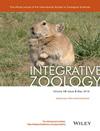Revealing the key signals in nestling begging behavior perceived by parent birds during parent–offspring conflict
IF 3.5
1区 生物学
Q1 ZOOLOGY
引用次数: 0
Abstract
The parent–offspring conflict in avian species encompasses resource allocation and a balance necessary for survival for both parties. Parental investment is modulated according to various factors, among which begging is important. Endogenous hormones, particularly corticosterone (CORT), play a role in modulating begging behavior. However, most studies on hormonal regulation of begging behavior induced elevated hormone levels in the offspring through feeding or injections, thus, limiting our knowledge of the evolution of the parent–offspring conflict under natural conditions. In this study, we aimed to identify the key signals that parents respond to during interactions with their nestlings in the wild, considering factors such as endogenous hormone CORT, nestling age, and brood size, which may affect nestling begging behavior. Begging performance was evaluated by measuring the begging frequency and score of the red‐whiskered bulbul (揭示亲鸟在亲子冲突中感知到的雏鸟乞讨行为的关键信号
鸟类的亲子冲突包括资源分配和双方生存所需的平衡。父母的投资受多种因素的影响,其中乞食是重要因素。内源性激素,尤其是皮质酮(CORT),在调节乞食行为方面发挥着作用。然而,大多数关于激素调节乞讨行为的研究都是通过喂食或注射来诱导后代体内激素水平的升高,从而限制了我们对自然条件下亲代与后代冲突演化的了解。在本研究中,我们旨在确定亲鸟在野外与雏鸟互动时所响应的关键信号,同时考虑可能影响雏鸟乞讨行为的内源性激素CORT、雏鸟年龄和育雏规模等因素。通过测量红须鹎(Pycnonotus jocosus)的乞食频率和得分以及评估羽毛中的CORT水平,对其乞食表现进行了评估。CORT水平与雏鸟的乞食频率和得分都有明显的相关性,而体重和跗节长度等变量并不影响亲鸟的觅食频率。此外,雏鸟数量(育雏规模)、年龄和乞食频率等因素也能预测亲鸟的觅食频率。我们的研究结果表明,乞食频率、雏鸟年龄和雏鸟大小是帮助引导亲鸟与后代之间错综复杂的冲突的信号,亲鸟可能会从雏鸟表现出的一系列乞食暗示中获得这些关键信号,从而调整其喂食策略。
本文章由计算机程序翻译,如有差异,请以英文原文为准。
求助全文
约1分钟内获得全文
求助全文
来源期刊

Integrative zoology
ZOOLOGY-
CiteScore
6.40
自引率
12.10%
发文量
81
审稿时长
>12 weeks
期刊介绍:
The official journal of the International Society of Zoological Sciences focuses on zoology as an integrative discipline encompassing all aspects of animal life. It presents a broader perspective of many levels of zoological inquiry, both spatial and temporal, and encourages cooperation between zoology and other disciplines including, but not limited to, physics, computer science, social science, ethics, teaching, paleontology, molecular biology, physiology, behavior, ecology and the built environment. It also looks at the animal-human interaction through exploring animal-plant interactions, microbe/pathogen effects and global changes on the environment and human society.
Integrative topics of greatest interest to INZ include:
(1) Animals & climate change
(2) Animals & pollution
(3) Animals & infectious diseases
(4) Animals & biological invasions
(5) Animal-plant interactions
(6) Zoogeography & paleontology
(7) Neurons, genes & behavior
(8) Molecular ecology & evolution
(9) Physiological adaptations
 求助内容:
求助内容: 应助结果提醒方式:
应助结果提醒方式:


